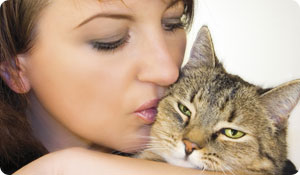
As many as 10 percent of people in the Unites States suffer from cat allergies, and exposure to these furry pets can cause itchiness, sneezing, and even wheezing To date, the only cat-allergy treatment options are allergy control medications and immunization therapy. But now a new study reported in the March 2011 issue of the Journal of Allergy and Clinical Immunology announces the development of a cat-allergy vaccine. When available, this cutting-edge vaccine will allow cat lovers and cat owners the chance to enjoy the company of their feline friends without feeling miserable.
Hope for Cat-Allergy Solutions
Researchers from McMaster University in Ontario, Canada, have developed an injection that tricks the immune system into tolerating cat allergens. To accomplish this goal, the scientists studied the body's response and gained a better understanding of how cat protein activates the immune system. They used this information to recreate parts of the cat protein through synthetic segments that were combined with real cat protein to form a cat-allergy vaccine. The idea is that the immune system will read the synthetic parts and overlook the true cat protein, thereby avoiding the reaction.
A group of 88 participants tried the vaccine and none of them experienced any serious side effects. Better yet, participants reduced their cat-allergy symptoms by nearly 40 percent.
A pharmaceutical company is now building on these findings to create a cat-allergy vaccine that can be used by the general public.
While the vaccine isn't available yet, there are steps you can take right now to help manage your cat-allergy symptoms:
- Banish your cat from your bedroom to keep your exposure to allergens at a minimum.
- Use HEPA filters to remove cat dander from the air.
- Steer clear of your pet's litter box since cat urine can be an allergy trigger.
- Bathe your pet every week or two using specially formulated pet shampoo. This can help remove any pollen or other allergens that are trapped in his hair and reduce the amount of dander, too.
- Minimize close contact with your pet. While you may love cuddling with your cat, the misery it causes afterwards may not be worth the benefits.
- Wash your hands and clothes after touching or holding her.
- Talk to your vet about feeding your cat special food that's formulated to keep shedding to a minimum. This may help to reduce your related symptoms.
- Talk to your allergist about different types of control medications that might help prevent a reaction or treat existing symptoms.
Sources:
"A Hypoallergenic Cat Vaccine Based on Fel d 1-Derived Peptides Fused to Hepatitis B PreS." Journal of Allergy and Clinical Immunology. JACI, March 2011. Web. 8 May 2011.
"Battling Pet Allergies." American Academy of Allergy, Asthma and Immunology. AAAAI, n.d. Web. 9 May 2011.
"JACI Highlights - February 2011." American Academy of Allergy, Asthma and Immunology. AAAAI, n.d. Web.9 May 2011.





